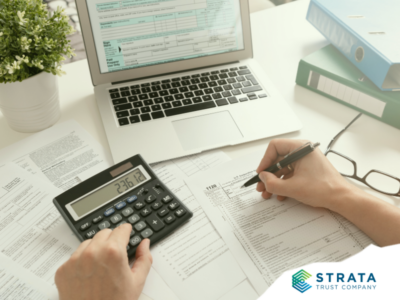Ready to get started?
STRATA supports investors, financial professionals and investment sponsors nationwide. If you’re looking to open a new account and have questions, we have over 350 years of experience in the custody of alternative investments and are ready to help you start carving your own path to retirement!
Fill out the form below to start a conversation or keep scrolling to
schedule a call with a self-directed IRA expert.
Are you a Strata account holder?
If you are an existing account holder our Client Services Team is available 24/7. Explore our Customer Support page for quick answers to common questions, quick links and our Client Services Team contact information.-
How do I contact STRATA?
You can obtain our contact information by clicking here: Contact Us
-
What is a self-directed IRA?
A self-directed IRA is a retirement account that puts you in control of your IRA investment. Unlike most retirement accounts whose investments are chosen by an account and/or fund manager, you choose what to invest in with a self-directed IRA. This allows you to diversify your retirement portfolio’s investment and potentially maximize returns.
-
Are Investments in a Self-Directed IRA Insured?
The cash held in your STRATA custodial account is FDIC-insured up to $250,000, but any other investments held by your IRA are not FDIC-insured, are not guaranteed by STRATA and may lose value.
-
Are self-directed IRAs a target for potential fraud?
While self-directed IRAs can be a safe way to invest retirement funds, investors should be mindful of potential fraudulent schemes when considering a self-directed IRA. Investors should understand that the custodians and trustees of self-directed IRAs may have limited duties to investors and that the custodians and trustees for these accounts will generally not evaluate the quality or legitimacy of an investment and its promoters. As with every investment, investors should undertake their own evaluation of the merits of a proposal and should check with regulators about the background and history of an investment and its promoters before making a decision. Learn more about how to protect yourself from fraud.
-
Can I Have a Self-Directed IRA if I Participate in a Retirement Plan at Work?
You can have a Traditional or Roth IRA whether or not you participate in another retirement plan through your employer or business. However, you might not be able to deduct all of your Traditional IRA contributions if you or your spouse participates in another retirement plan at work. Roth IRA contributions might be limited if your income exceeds a certain level.
-
Does STRATA Offer Any Investment Products or Investment Advice?
As a directed IRA custodian, STRATA does not sell investment products or provide investment advice. Custodians do not provide investment, tax or legal advice, so clients needing these services are urged to contact their professional advisor.
Great Content is Just a Click Away

7 Things You Might Not Know About an IRA
In the spirit of April being Financial Literacy Month, it’s a great time to point out some of the details about your self-directed IRA (SDIRA) that you might not be...

Will I Owe Tax on My Self-Directed IRA Investments?
Self-directed IRAs (SDIRAs) can offer incredible benefits. With Traditional IRAs, contributions may be deductible, and investment growth is tax deferred until the assets are distributed—and with Roth IRAs, qualified distributions...

How to Report Rollovers on Your Tax Return
Did you move any retirement savings last year to a new account or provider? Whether you moved money from your former employer’s retirement plan to your new employer’s retirement plan...



